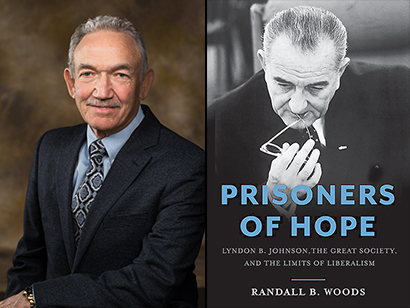FAYETTEVILLE, Ark. – There was a time in American history when politics worked, said Randall B. Woods, a University of Arkansas historian who has written a new book about President Lyndon Johnson’s sweeping legislative agenda known as “The Great Society.”
In Prisoners of Hope: Lyndon B. Johnson, the Great Society, and the Limits of Liberalism, Woods presents the first comprehensive history of the Great Society, exploring both the breathtaking possibilities of visionary politics, as well as its limits.
Over the course of his time in office, 1963-1968, the height of the turbulent 1960s, Johnson’s administration worked with Congress to pass more than 1,000 pieces of legislation designed to address an extraordinary array of social issues. Poverty and racial injustice were foremost among them, but the Great Society program included legislation on issues ranging from health care to immigration to education and environmental protection.
“Most of the major issues being debated today – educational guidelines, immigration reform, urban unrest, civil rights, health care – all of those things have their policy origins in the Great Society,” said Woods, Distinguished Professor of history in the J. William Fulbright College of Arts and Sciences. “The Great Society was breathtaking in its scope and dramatic in its impact. It created the social bedrock on which our current structure rests.”
The Great Society was, according to Woods, perhaps the most comprehensive and ambitious effort to change the political, social and economic landscape of the United States in the country’s history. It was a liberal agenda descended from previous reform movements that began with Populism and continued through the Progressive Era and the New Deal.
Johnson was an “ardent New Dealer,” according to Woods, who returned to his roots upon taking office in November 1963 after the assassination of John F. Kennedy. But Johnson, unlike the leaders of those previous reform movements, made civil rights front and center in his plan. The Great Society included the 1964 Civil Rights Act and the 1965 Voting Rights Act, but other landmark legislation incorporated equal access under the law.
“Medicare was a civil rights act – it led to desegregation of hospitals in the South,” Woods said. “Federal aid to education through the Elementary and Secondary Education Act was a civil rights measure because in order to receive the funding, a school district had to certify its compliance with the 1954 Brown v. Board decision. One could argue that the Great Society was all about civil rights.”
There were unintended consequences in some of the liberal initiatives, however, notably welfare reform in Johnson’s War on Poverty program. Johnson promised to eliminate the welfare rolls through job training and educational opportunity, but the Office of Economic Opportunity, established in 1964, funded the National Welfare Rights Organization, whose function “was to get as many people on the welfare rolls as possible,” Woods said.
Woods, the John A. Cooper Professor of History in Fulbright College, is the author of the critically acclaimed 2006 book, LBJ: Architect of American Ambition. He is a recognized scholar in the field of U.S. diplomatic history, and has published nine books on various topics including Vietnam, the Cold War and Sen. J. William Fulbright.
Prisoners of Hope is published by Basic Books.
Woods discusses the Great Society in a new episode of Short Talks from the Hill, a podcast available on the Research Frontiers website.
Contacts
Randall B. Woods, Distinguished Professor of History
J. William Fulbright College of Arts and Sciences
479-575-5097,
Chris Branam, research communications writer/editor
University Relations
479-575-4737,
